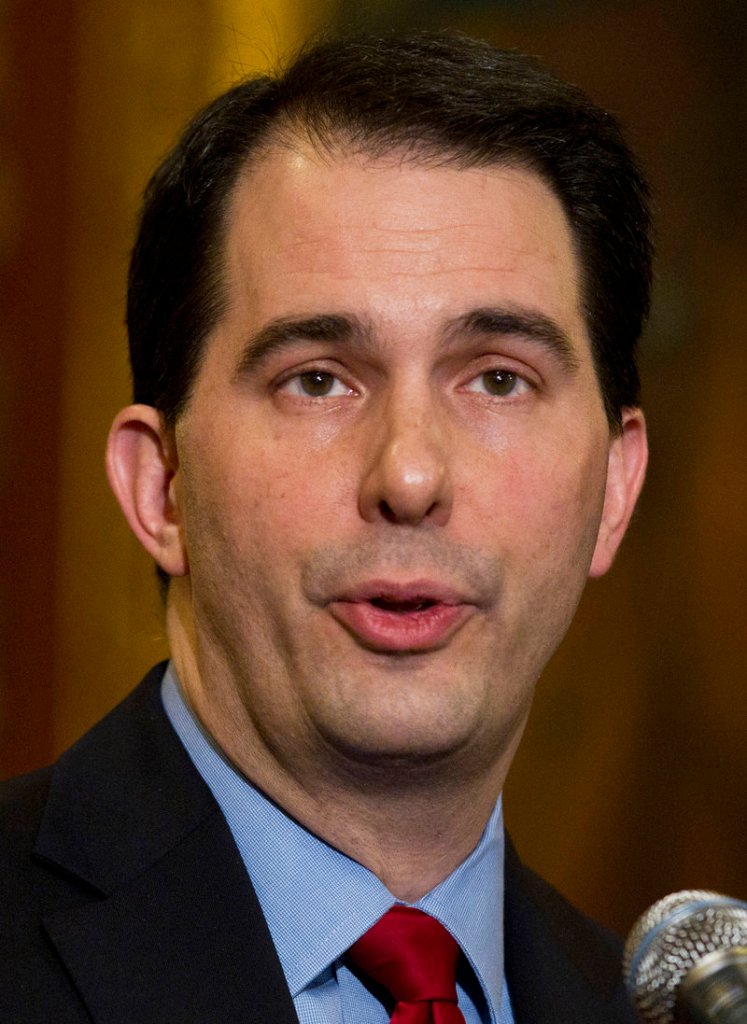MADISON, Wis. – Wisconsin Gov. Scott Walker on Friday signed into law the proposal that eliminates most union rights for public employees, saying he had “no doubt” that support for the measure would grow over time.
The governor’s signature on the bill quietly concluded a debate over collective bargaining that provoked three weeks of relentless protests at the Capitol.
In an interview, Walker, a Republican, said once the public sees government becoming more efficient, support for the changes will increase.
“What we’re doing here, I think, is progressive. It’s innovative. It’s reform that leads the country, and we’re showing there’s a better way by sharing in that sacrifice with all of us in government,” he said.
Walker, 43, who has swiftly become one of the most polarizing politicians in the country, signed the legislation in private Friday morning. At a ceremonial signing later in the day, he said the new law would be “good for the middle class for years to come.”
The governor insisted the proposal was necessary to balance the state budget, and he never backed down, even after 14 Senate Democrats fled the state in an attempt to block the bill. The drama touched off an intense national debate over labor rights for public employees.
Parts of the fight were sure to continue in the courts and in the battle over the broader state budget.
On Friday, the Democratic executive of Dane County asked a court to find passage of the law to be unconstitutional, arguing in part that it was adopted without the required quorum. A judge denied an emergency request to block the measure and scheduled a longer hearing for Wednesday.
Walker said he was confident the law would withstand legal challenges.
The law does not take effect until the state issues an official notice that it has been enacted, and the notice is published in the Madison newspaper. Secretary of State Doug La Follette said he typically takes 10 business days to send the notice. Given the court action, he said he was not going to act any sooner than that.
Walker’s success was a key victory for Republicans who have targeted unions in efforts to slash government spending.
Labor leaders and Democrats vowed to use the setback to fire up their supporters across the country and mount a counterattack against the GOP at the ballot box in 2012.
Senate Minority Leader Mark Miller said the GOP was not listening to the people.
“Republicans may have achieved a short-term policy goal, but their radical agenda, the war on working families, has been exposed, and the people of Wisconsin and across the country are united against it as never before,” Miller, a Democrat, said in a statement.
Democrats said the battle with Walker helped them raise nearly $1 million in a matter of days, and efforts to recall GOP state senators who sided with Walker were gaining momentum.
Walker issued a message of his own Friday seeking donations from supporters.
“The voters of Wisconsin didn’t elect me to pass the buck or run away from a tough fight,” said the governor, who asked for donations starting at $100 and said he hoped to reach $150,000 within a month.
The measure passed both chambers of the Republican-led state Legislature earlier this week. The Senate cleared the way with a surprise move Wednesday that allowed lawmakers to approve the bill without any Democratic senators present. The state’s Assembly followed suit Thursday.
As well as ending collective bargaining, the law forces state workers to pay more for pensions and health insurance — changes that will save an estimated $30 million to help pay down a budget shortfall project to be $137 million by July 1. The higher payments for state workers will take effect in the coming weeks.
Send questions/comments to the editors.



Success. Please wait for the page to reload. If the page does not reload within 5 seconds, please refresh the page.
Enter your email and password to access comments.
Hi, to comment on stories you must . This profile is in addition to your subscription and website login.
Already have a commenting profile? .
Invalid username/password.
Please check your email to confirm and complete your registration.
Only subscribers are eligible to post comments. Please subscribe or login first for digital access. Here’s why.
Use the form below to reset your password. When you've submitted your account email, we will send an email with a reset code.